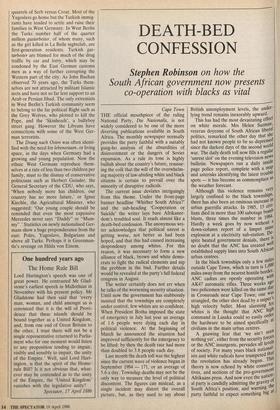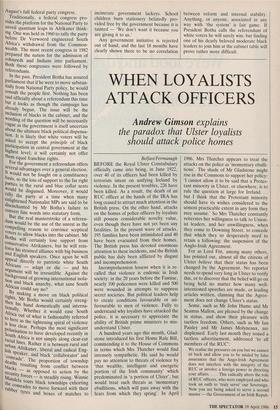DEATH-BED CONFESSION
Stephen Robinson on how the
South African government now presents co-operation with blacks as vital
Cape Town THE official mouthpiece of the ruling National Party, Die Nasionalis, is not widely considered to be one of the more diverting publications available in South Africa. The monthly newspaper normally provides the party faithful with a suitably gung-ho analysis of the absurdities of disinvestment or the dangers of Soviet expansion. As a rule its tone is highly bullish about the country's future, reassur- ing the yolk that the will of the overwhelm- ing majority of law-abiding white and black citizens is certain to prevail over the minority of disruptive radicals.
The current issue deviates intriguingly from this theme. Under the front-page banner headline 'Whither South Africa?' and the sub-heading 'Cooperation or Suicide' the writer lays bare Afrikaner- dom's troubled soul. It reads almost like a death-bed confession. The anonymous wri- ter acknowledges that political unrest is getting worse, not better as had been hoped, and that this had caused increasing despondency among whites. For this reason, it was necessary to form a new alliance of black, brown and white demo- crats to fight the radical elements, and nip the problem in the bud. Further details would be revealed at the party's full federal congress in August.
The writer certainly does not err when he talks of the worsening security situation. Until now the government has stubbornly insisted that the townships are completely under control; few whites are so confident. When President Botha imposed the state of emergency in July last year an average of 1.6 people were dying each day in political violence. At the beginning of March he announced the situation had improved sufficiently for the emergency to be lifted: by then the death rate had more than doubled to 3.8 people each day.
Last month the death toll was the highest since the current wave of violence began in September 1984 — 171, or an average of 5.6 a day. Township deaths may not be the only way to measure the level of political discontent. The figures can mislead, as a single incident may distort the overall picture, but, as they used to say about
British unemployment levels, the under- lying trend remains inexorably upward. This has had the most devastating effect on white morale. Mrs Helen Suzman, veteran doyenne of South African liberal politics, remarked the other day that she had not known people to be so depressed since the darkest days of the second world war. The daily death toll now fills a regular 'unrest slot' on the evening television news bulletin. Newspapers run a daily inside page police report, complete with a map and asterisks identifying the latest trouble spots — it has become as commonplace as the weather forecast.
Although this violence remains verY largely confined to the black townshipS, there has also been an ominous increase ip urban guerrilla attacks. In 1985, 15 civi- lians died in more than 100 sabotage bomb blasts, three times the number in 1984. Hardly a week goes by now without a down-column report of a limpet mule explosion at a electricity sub-station. De- spite heated government denials, there Is no doubt that the ANC has created well established supply lines into South African urban centres. In the black townships only a few miles outside Cape Town, which in turn is 1,0w miles away from the nearest hostile border, ANC cadres are openly operating with AK47 automatic rifles. Three weeks age two policemen were killed on the same day in Crossroads near Cape Town; one was strangled, the other shot dead by a sniper 5 high velocity bullet. Most alarming for whites is the thought that ANC lug' command in Lusaka could so easily order the hardware to be aimed specifically at civilians in the main urban centres. A gnawing fear that 'we ain't seen nothing yet', either from the security forces or the ANC insurgents, pervades all levels of society. For many years black national- ists and white radicals have trumpeted that the revolution has already begun. ThIs theory is now echoed by white conserva: tives, and sections of the pro-government Afrikaans press. And now even the nation- al party is candidly admitting the gravity of South Africa's position, and warning the party faithful to expect something big at August's full federal party congress. Traditionally, a federal congress pro- vides the platform for the National Party to unveil quantum leaps in Afrikaner think- ing. One was held in 1960 to rally the party before Dr Verwoerd engineered South Africa's withdrawal from the Common- wealth. The most recent congress in 1982 I prepared the nation for the admission of coloureds and Indians into parliament. Both these congresses were followed by referendums.
In the past, President Botha has assured parliament that if he were to move substan- tially from National Party policy, he would consult the people first. Nothing has been said officially about a referendum this time but it looks as though the campaign has already begun. The issue will be the inclusion of blacks in the cabinet, and the wording of the question will be necessarily vague as the government is itself uncertain about the ultimate black political dispensa- tion. It is likely that white voters will be asked to accept the principle of black Participation in central government at the highest level; it will certainly not offer them equal franchise rights. For the government a referendum offers several advantages over a general election. It would not be fought on a constituency basis, so the loss of support to the far right Parties in the rural and blue collar seats would be disguised. Moreover, it would rally the party at a time when many enlightened Nationalist MPs are said to be disenchanted by Mr Botha's failure to convert fine words into statutary form. But the real masterstroke of a referen- dum would be the use of the unrest as the compelling reason to convince sceptical voters to allow blacks into the cabinet. Mr Botha will certainly lose support from conservative Afrikaners, but he will rein- force his strained alliance with big business and English speakers. Once again he will appeal directly to patriotic white South Africans — adapt or die — and his argument will be irresistible. Against the background of growing. international isola- tion and black anarchy, what sane South African could say no? By making a move on black political rights, Mr Botha would certainly streng- then his hand domestically and interna- tionally. Whether it would ease South Africa out of what is fashionably referred to here as the tightening spiral of violence Is less clear. Perhaps the most significant Polarisation to have developed recently in South Africa is not simply along clear-cut racial lines. Rather it is between rural and _urban Afrikaner, liberal and radical Eng- lish speaker, and black 'collaborator' and _,comrades. The proportion of township u, e, aths resulting from conflict between soiacks — as opposed to action by the ecurity forces — is steadily rising. Winnie Mandela tours black townships exhorting rubber comrades to move forward with their lubber tyres and boxes of matches to incinerate government lackeys. School children burn stationery belatedly pro- vided free by the government because it is tainted — 'We don't want it because you are giving it to us.'
Any government initiative is rejected out of hand, and the last 18 months have clearly shown there to be no correlation between reform and internal stability. Anything, or anyone, associated in any way with 'the system' is fair game. If President Botha calls the referendum of white voters he will surely win; but finding one of his dearly beloved moderate black leaders to join him at the cabinet table will prove rather more difficult.



















































 Previous page
Previous page